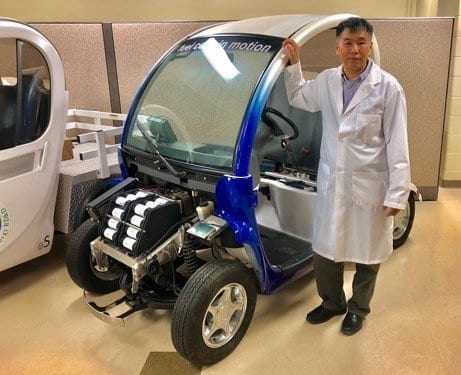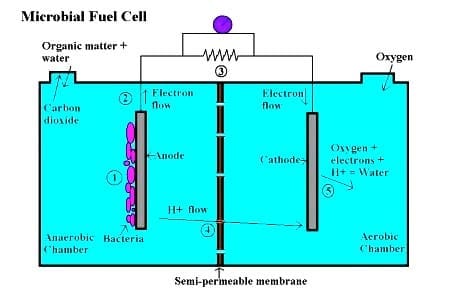
via University of Waterloo
Advancements in zero-emission fuel cells could make the technology cheap enough to replace traditional gasoline engines in vehicles, according to researchers at the University of Waterloo.
The researchers have developed a new fuel cell that lasts at least 10 times longer than current technology, an improvement that would make them economically practical, if mass-produced, to power vehicles with electricity.
“With our design approach, the cost could be comparable or even cheaper than gasoline engines,” said Xianguo Li, director of the Fuel Cell and Green Energy Lab at Waterloo. “The future is very bright. This is clean energy that could boom.”
Researchers initially concentrated on hybrid vehicles, which now have gas engines as well as batteries due to issues involving limited driving range and long charging times.
Existing fuel cells could theoretically replace those gas engines, which power generators to recharge batteries while hybrid vehicles are in operation, but are impractical because they are too expensive.
The researchers solved that problem with a design that makes fuel cells far more durable by delivering a constant, rather than fluctuating, amount of electricity.
That means the cells, which produce electricity from the chemical reaction when hydrogen and oxygen are combined to make water, can be far simpler and therefore far cheaper.
“We have found a way to lower costs and still satisfy durability and performance expectations,” said Li, a professor of mechanical and mechatronics engineering. “We’re meeting economic targets while providing zero emissions for a transportation application.”
Researchers hope the introduction of fuel cells in hybrid vehicles will lead to mass production and lower unit costs. That could pave the way for the replacement of both batteries and gas engines entirely by providing an affordable, safe, dependable, clean source of electrical power.
“This is a good first step, a transition to what could be the answer to the internal combustion engine and the enormous environmental harm it does,” said Li.
Learn more: Clean fuel cells could be cheap enough to replace gas engines in vehicles
The Latest on: Zero-emission fuel cells
[google_news title=”” keyword=”zero-emission fuel cells” num_posts=”10″ blurb_length=”0″ show_thumb=”left”]
via Google News
The Latest on: Zero-emission fuel cells
- Toyota Establishes Hydrogen Headquarters to Accelerate Advancement of Fuel Cell Technologyon May 1, 2024 at 4:00 am
Reaffirming its commitment to support fuel cell and additional hydrogen-related products and technology toward a hydrogen economy, Toyota Motor North America (TMNA) today announced that it is renaming ...
- Fueling the future: Researchers evaluate emissions in the aviation industryon April 29, 2024 at 1:59 pm
A research group led Prof. Fei Wei and Chenxi Zhang in Tsinghua University has published a perspective paper that evaluates the progression from deep-rooted fossil-fuel-dependent technologies to ...
- Hydrogen Fuel-Cell Vehicles: Everything You Need to Knowon April 29, 2024 at 10:20 am
Hydrogen fuel-cell vehicles are related to electric cars, but these machines have pros and cons that make them different from the typical battery-powered EV.
- Hydrogen’s transformative potential as a fuel source for carson April 29, 2024 at 9:14 am
In the quest for carbon neutrality, Battery Electric Vehicles get all the hype. But does hydrogen offer unsung potential? Chris Farnell reports.
- Boston orders 80 advanced zero-emission buses from NFI subsidiary New Flyer with options to purchase an additional 380 buseson April 29, 2024 at 4:00 am
Purchase of New Flyer’s zero-emission Xcelsior CHARGE NG™ buses marks a major step forward in Massachusetts Bay Transportation Authority’s effort to transition to an all-electric bus fleet ST. CLOUD, ...
- Getting to 100% zero-emission buses for LA Metro will take five years longeron April 26, 2024 at 2:12 pm
Metro staff said with most zero-emission buses maxing out at 150-mile range, this would be OK for many bus routes but not all. The existing technology of zero-emission buses would not meet all 2,000 ...
- Wireless Trains and Fuel Economy - IDTechEx Explores the Potential Behind Electric and Zero-Emission Trainson April 26, 2024 at 6:00 am
BOSTON, April 26, 2024 /PRNewswire/ -- Trains that could travel to more tucked-away parts of the country with zero emissions are an example of the potential behind battery electric (BEV) and fuel cell ...
- Volvo sees three paths to zero emissionson April 25, 2024 at 10:18 am
Volvo Trucks is charting three separate courses, each of which will take it to the same end result – that of being a zero-emission truck maker. None of ...
- GILLIG to develop hydrogen fuel cell powered buson April 25, 2024 at 9:05 am
GILLIG is collaborating with BAE Systems and Ballard Power Systems on the development of the hydrogen fuel cell bus.
- Industry Trends: An Overview of Hydrogen Fuel in Constructionon April 23, 2024 at 7:37 am
The construction industry, a significant contributor to global carbon emissions, is on the brink of a revolution spearheaded by the adoption of alternative fuel ...
via Bing News










